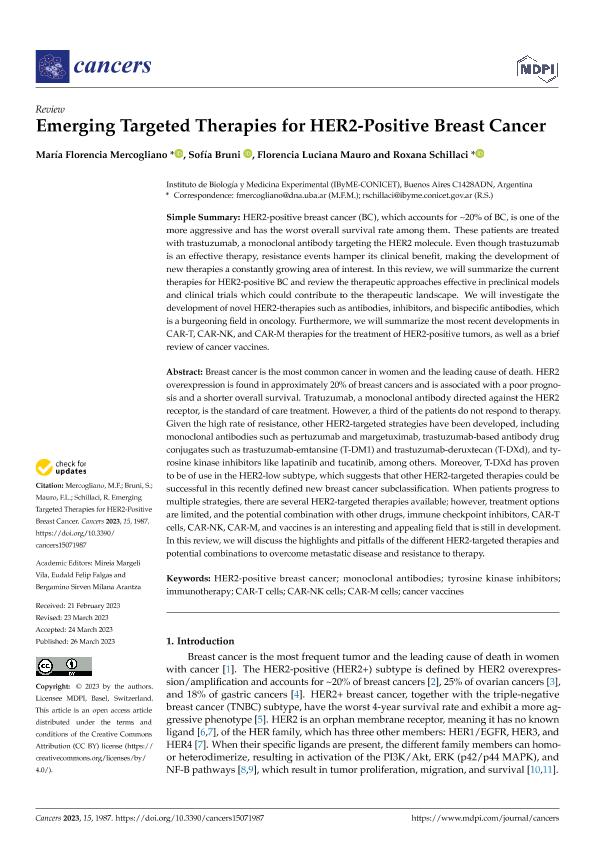Mostrar el registro sencillo del ítem
dc.contributor.author
Mercogliano, María Florencia

dc.contributor.author
Bruni, Sofia

dc.contributor.author
Mauro, Florencia Luciana
dc.contributor.author
Schillaci, Roxana

dc.date.available
2023-10-25T15:52:28Z
dc.date.issued
2023-04
dc.identifier.citation
Mercogliano, María Florencia; Bruni, Sofia; Mauro, Florencia Luciana; Schillaci, Roxana; Emerging Targeted Therapies for HER2-Positive Breast Cancer; MDPI; Cancers; 15; 7; 4-2023; 1-50
dc.identifier.issn
2072-6694
dc.identifier.uri
http://hdl.handle.net/11336/215932
dc.description.abstract
Breast cancer is the most common cancer in women and the leading cause of death. HER2 overexpression is found in approximately 20% of breast cancers and is associated with a poor prognosis and a shorter overall survival. Tratuzumab, a monoclonal antibody directed against the HER2 receptor, is the standard of care treatment. However, a third of the patients do not respond to therapy. Given the high rate of resistance, other HER2-targeted strategies have been developed, including monoclonal antibodies such as pertuzumab and margetuximab, trastuzumab-based antibody drug conjugates such as trastuzumab-emtansine (T-DM1) and trastuzumab-deruxtecan (T-DXd), and tyrosine kinase inhibitors like lapatinib and tucatinib, among others. Moreover, T-DXd has proven to be of use in the HER2-low subtype, which suggests that other HER2-targeted therapies could be successful in this recently defined new breast cancer subclassification. When patients progress to multiple strategies, there are several HER2-targeted therapies available; however, treatment options are limited, and the potential combination with other drugs, immune checkpoint inhibitors, CAR-T cells, CAR-NK, CAR-M, and vaccines is an interesting and appealing field that is still in development. In this review, we will discuss the highlights and pitfalls of the different HER2-targeted therapies and potential combinations to overcome metastatic disease and resistance to therapy.
dc.format
application/pdf
dc.language.iso
eng
dc.publisher
MDPI
dc.rights
info:eu-repo/semantics/openAccess
dc.rights.uri
https://creativecommons.org/licenses/by/2.5/ar/
dc.subject
CANCER VACCINES
dc.subject
CAR-M CELLS
dc.subject
CAR-NK CELLS
dc.subject
CAR-T CELLS
dc.subject
HER2-POSITIVE BREAST CANCER
dc.subject
IMMUNOTHERAPY
dc.subject
MONOCLONAL ANTIBODIES
dc.subject
TYROSINE KINASE INHIBITORS
dc.subject.classification
Inmunología

dc.subject.classification
Medicina Básica

dc.subject.classification
CIENCIAS MÉDICAS Y DE LA SALUD

dc.title
Emerging Targeted Therapies for HER2-Positive Breast Cancer
dc.type
info:eu-repo/semantics/article
dc.type
info:ar-repo/semantics/artículo
dc.type
info:eu-repo/semantics/publishedVersion
dc.date.updated
2023-10-25T10:09:12Z
dc.journal.volume
15
dc.journal.number
7
dc.journal.pagination
1-50
dc.journal.pais
Suiza

dc.description.fil
Fil: Mercogliano, María Florencia. Consejo Nacional de Investigaciones Científicas y Técnicas. Instituto de Biología y Medicina Experimental. Fundación de Instituto de Biología y Medicina Experimental. Instituto de Biología y Medicina Experimental; Argentina
dc.description.fil
Fil: Bruni, Sofia. Consejo Nacional de Investigaciones Científicas y Técnicas. Instituto de Biología y Medicina Experimental. Fundación de Instituto de Biología y Medicina Experimental. Instituto de Biología y Medicina Experimental; Argentina
dc.description.fil
Fil: Mauro, Florencia Luciana. Consejo Nacional de Investigaciones Científicas y Técnicas. Instituto de Biología y Medicina Experimental. Fundación de Instituto de Biología y Medicina Experimental. Instituto de Biología y Medicina Experimental; Argentina
dc.description.fil
Fil: Schillaci, Roxana. Consejo Nacional de Investigaciones Científicas y Técnicas. Instituto de Biología y Medicina Experimental. Fundación de Instituto de Biología y Medicina Experimental. Instituto de Biología y Medicina Experimental; Argentina
dc.journal.title
Cancers
dc.relation.alternativeid
info:eu-repo/semantics/altIdentifier/doi/http://dx.doi.org/10.3390/cancers15071987
Archivos asociados
